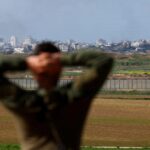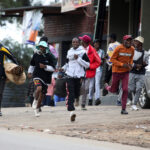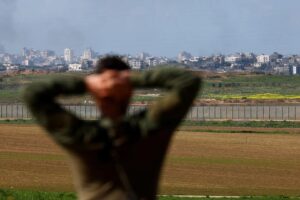Senegalese authorities block access to social media app TikTok amid unrest, days after dissolving opposition party.
Senegalese authorities have blocked access to social media app TikTok, widening a clampdown on dissent days after they dissolved the main opposition party and detained its leader.
“The TikTok application is the social network of choice for ill-intentioned people to spread hateful and subversive messages threatening the stability of the country,” the minister of communications and the digital economy, Moussa Bocar Thiam, said in a statement on Wednesday.
Authorities cut mobile data access on Monday, with several human rights groups denouncing the measure.
A power struggle between PASTEF party leader Ousmane Sonko and President Macky Sall has led to violent demonstrations at times and damaged Senegal’s reputation as the most stable democracy in West Africa.
There has been a wave of military coups in the region during the last three years, including in Niger last week.
‘Democratic crisis’
Dakar resident Abdou Dione said the state should not suspend TikTok based solely on negative aspects.
“It’s an application where you can also learn a lot, and not just see vulgar things,” Dione said.
Young street vendors are using applications like WhatsApp as part of their online sales, Papis Gaye said.
“So taking the decision to cut off the internet means prohibiting us from selling,” Gaye said.
“I’d have to try the VPN, just to be able to connect, but it’s a pain. In the end, you’re tired and discouraged.”
Adjaratou Wakha Aidara, a political analyst, said there is “a democratic crisis in Senegal”.
“This is the first time that six months before elections, we don’t know who’s going to run,” she told Al Jazeera.
“The future of democracy here is uncertain. We have a young population that needs change and expresses themselves through social networks and on the streets.”
‘Extremely serious measure’
Sonko was charged on Saturday with plotting an insurrection and other offences, and taken into custody.
Opposition supporters, who have held protests throughout the year, accuse Sall of levelling charges in order to disqualify Sonko from a presidential election due next year.
The government denies this and blames Sonko and PASTEF for stoking violence.
On Monday night two people were killed in opposition protests in the southern city of Ziguinchor, where Sonko is mayor, and two people burned to death on Tuesday when attackers hurled petrol bombs into a passenger bus.
“The government’s decision to dissolve PASTEF violates freedom of expression, association, peaceful assembly, and democratic participation,” Human Rights Watch said in a statement Tuesday evening. It called on authorities to reinstate the party and restore the internet.
“The dissolution of a political party is an extremely serious measure, which should only be used as a last resort … in accordance with democratic principles and respect for fundamental rights,” the International Federation for Human Rights said in a statement on Wednesday.
Amnesty International has also denounced the internet restrictions.
Riots broke out across Senegal in June, killing at least 16 people, after Sonko was sentenced to two years in prison for immoral behaviour towards people younger than 21. He has yet to start serving that term.
Sonko, who denies wrongdoing, had urged his followers to take to the streets at the time.
A month ago Sall ended widespread speculation by saying he would not seek a third term as president next year, which critics had said would be illegal. His party has yet to put forward its preferred candidate for the election.
Source : ALJAZEERA















